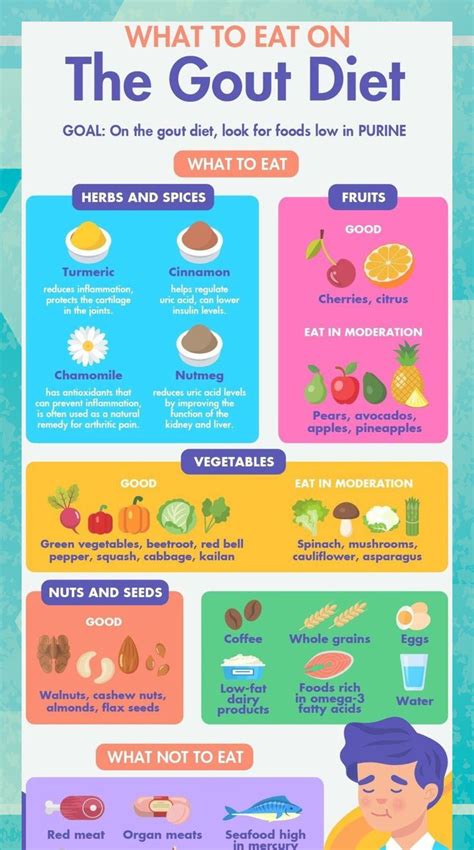For men, what specific dietary recommendations are given to help manage and prevent gout, a condition more prevalent in men?

Understanding Gout and Its Dietary Connection for Men
Gout, a painful form of inflammatory arthritis, is characterized by sudden, severe attacks of pain, redness, tenderness, and swelling in joints, often the big toe. While it can affect anyone, gout is significantly more prevalent in men, particularly those aged 40-60. The primary cause is hyperuricemia – an excess of uric acid in the blood – which leads to the formation of urate crystals in the joints. Diet plays a crucial role in managing uric acid levels, making specific nutritional strategies vital for prevention and management.

Key Dietary Principles for Gout Management
For men looking to prevent or manage gout, the focus is on reducing uric acid production and aiding its excretion. This involves a multi-faceted approach to diet, rather than simply eliminating one food group.
Stay Hydrated
Drinking plenty of water is perhaps one of the simplest yet most effective ways to help flush uric acid from the body. Aim for 8-12 glasses (2-3 liters) of water daily. Proper hydration can dilute uric acid and promote kidney function, which helps excrete it.
Manage Your Weight
Obesity is a significant risk factor for gout and can exacerbate existing symptoms. Gradual weight loss, through a combination of diet and exercise, can lower uric acid levels and reduce stress on weight-bearing joints. Crash diets or rapid weight loss, however, can sometimes temporarily elevate uric acid, so a steady, sustainable approach is key.
Foods to Limit or Strictly Avoid
Certain foods and beverages are high in purines, which are compounds that the body breaks down into uric acid. Limiting these can significantly impact uric acid levels.
- High-Purine Meats: Organ meats (liver, kidney, sweetbreads), red meats (beef, lamb, pork), and game meats. Try to limit these to small, infrequent portions, or avoid them altogether during flare-ups.
- Certain Seafood: While some fish are healthy, high-purine varieties include anchovies, sardines, herring, mussels, scallops, trout, and tuna. Moderate intake of other fish may be acceptable, but avoid high-purine types.
- Alcohol: Especially beer, which is high in purines, and spirits, which can impair uric acid excretion. Wine, in moderation, may have less of an impact but should still be consumed cautiously. Alcohol consumption increases uric acid production and reduces its excretion.
- Sugary Drinks and Foods: Fructose, a sugar found in soft drinks, fruit juices (even “natural” ones), and many processed foods, significantly increases uric acid production. Opt for water over sugary beverages.

Foods to Embrace for Gout Prevention and Management
Conversely, many foods can help lower uric acid or support overall health without contributing to gout flares.
- Fruits and Vegetables: Most fruits and vegetables are low in purines. Cherries, in particular, have been shown to help lower uric acid levels and reduce inflammation. Vitamin C-rich foods like citrus fruits and bell peppers may also offer protective effects.
- Low-Fat Dairy Products: Skim milk, low-fat yogurt, and cheese have been associated with lower uric acid levels and a reduced risk of gout attacks. They may promote uric acid excretion.
- Complex Carbohydrates: Whole grains (oats, brown rice, whole-wheat bread) provide fiber and energy without contributing to uric acid build-up. Avoid refined carbohydrates like white bread and pastries.
- Plant-Based Proteins: Legumes (lentils, beans) and nuts offer good protein sources. While some plant-based purines exist, they do not appear to pose the same risk as animal-based purines.
- Coffee: Moderate coffee consumption has been linked to lower uric acid levels in some studies, though the exact mechanism is still being researched. If you already drink coffee, it’s generally considered safe in moderation.

Beyond Diet: Lifestyle and Professional Guidance
While diet is a cornerstone, other lifestyle factors are also important. Regular exercise, stress management, and avoiding certain medications (like some diuretics) that can raise uric acid levels are also beneficial. It’s crucial to work with a healthcare professional, such as a doctor or registered dietitian, to develop a personalized gout management plan. They can help you identify specific triggers, monitor uric acid levels, and advise on medication if necessary, alongside dietary changes.

Conclusion
Managing and preventing gout in men relies heavily on thoughtful dietary choices. By prioritizing hydration, maintaining a healthy weight, limiting high-purine foods, alcohol, and sugary drinks, and embracing a variety of low-purine, nutrient-rich foods, men can significantly reduce the frequency and severity of gout attacks. These dietary adjustments, when combined with professional medical advice, offer a powerful strategy for living a healthier, gout-free life.








